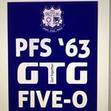Farouk Gulsara's Blog, page 163
June 29, 2016
It is all point of view!
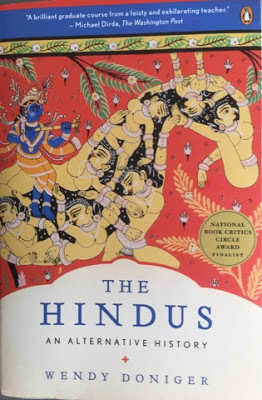 The Hindus, An Alternative History
The Hindus, An Alternative History
Author: Wendy Doniger
Everything that happens in life is seen from a particular perspective. One can say that a cup is half full or half empty, both indicating the same thing. A tiny structure that we see from the corner of our eye over the horizon is actually a mammoth ocean liner that dwarfs everything adjacent to it. It is all in its interpretation. It also depends on our understanding fueled by our past experiences and know how. We see what we want to see. We sometimes are blind to the elephant in the room. And the senses do not appreciate what the mind does not know!
From the outset, the author, a holder of doctorates in Sanskrit and India studies, qualifies her work as an alternative interpretation of the history of Hinduism in India.
Just like the picture of the markings on the moon which is depicted below, the impression on the moon can be interpreted as a man (Cain the wanderer and murderer), rabbit or duck, depending on his background, exposure and culture.
The author explores alternative narratives from the disadvantaged groups of the land, the non-Brahmins, the tribes, the second-class citizens like women and the outcasts of society. The Brahmins and the rulings clans were the privileged groups who had the access to knowledge and wrote the doctrines on how things should run in kingdoms. In essence, they decided what law is and what is divinity.
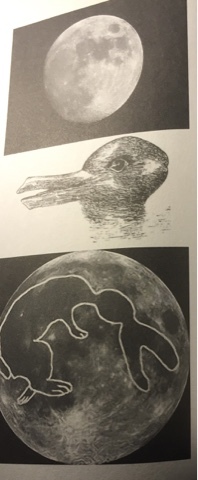
The kings and members of the warrior castes must have felt remorseful with all killings and the sufferings by people at their hands. The Brahmins, with their vast know-how on how to appease the Divine Forces, must have had pacified their bosses that recourse can be made via prayers which only the Brahmin can handle. In return, they received remunerations in the form of (holy) cows. Cows were revered commodities, and the priests were paid in cows. The success of a Brahmin is measured by the number of cows that he owned. They put divinity on it, prohibiting culling and consumption of its flesh.
Sacrifice, of the animal kind, is as old as politics. And politics is known as the second oldest profession in the world. Horse sacrifice is mentioned in the Rig Veda as the highest form of sacrifice that Man can perform for the Gods. The only caveat is that it can only be done by the King, and only the Brahmins have the knowledge this ritual. One can understand where this liaison is leading. The horse must be a white one, is let loose to roam freely for a year, under the watchful eyes of the royal henchmen. No one (peasants/ landowners) is allowed to disturb the movement of this 'sacrificial lamb' or bear the prospect of having his land possessed by the King's men. One can see where this ritual is going. It appears like a legitimate way to spread the Ruler's influence.
Little juicy snippets like these which easily excite troublemakers must have incurred the wrath the Hindutva movements which have been undergoing a renaissance of late. Hence, this book was withdrawn from the shelf after many legal wrangles. It only created a ready market and demand for it (Streisand effect). Hail internet marketing!
From the Sanskrit scriptures and oral traditions, the author managed to pen down, in a 770+ page paperback, the events that were supposed to have happened in a land blessed with rivers that started a civilisation way back about 4500 years ago all through the Invasion of foreign powers and dissemination of different faiths.
For a person who had been brought in the Hindu tradition who is receptive to logical explanations to the rituals, I found this book utterly enlightening. Some quarters who claim to be guardians of the religion look at the practice from a totally Brahmanic Northern Indian perspective. Lest one forgets that many non-Brahmins have inputs to enrich it. The Puranic movements and even the members of the lower rung of the society, through their the devotion did the same.
Many of the Hindu practices evolved over time in tandem with the change of times. In keeping with the growing influences of Jaina and Buddhists movement which provided an alternative to the Hindu's dogmatic social closeting, its practices were altered as a reactionary gesture.
An interesting thing that crops so often is the escape clause in the pre-destined journey of life. The soul is said to be paying back for the sins committed in previous births, and it cannot be altered. At the same time, the scriptures promise of certain prayers and ritual sacrifices (of milk and grain) that can offset this destiny!
Offshoots from the main way of life sprung in India over time. People who were unhappy with certain practices and explanations ventured to other belief systems. There was a time when kshatriyas started doing what the Brahmins were doing. Siddharta Gautama and Mahavir, both of fighters' stock, renounced their power to find the real meaning of life. Their path gained popularity, authority and wealth for some time till they began too big for their own shoes. Hinduism started modifying their way of doing things to draw back deserters. Even within Hinduism, Shaivaites and Vaishvanites were engaged in a popularity contest. A little later, invaders from the North brought in Islam to join in the foray to enjoy a piece of the action. These quests did, however, has its plus points. They each contributed in their own ways in the fields of literature, architecture, engineering, economy, knowledge, philosophy and much more.
The British Raj era bared open the long lost mysteries of this ancient civilisation. Not only they squandered this sub-continent of its gems and wealth, there destroyed an unusual symbiotic relationship that its people had shared over generations. On the other hand, they brought in industrialisation (?for self-interest) and re-discover lost ancient knowledge. The British archaeologists painstakingly found the lost kingdom of Shakya, the birthplace of Buddha and many Buddhist scripts.
Fast forward into the twenty-first century, the unique relationship that the ancient dwellers of Indus shared with his hostile environment and all the puzzling occurrences around him have changed course. Priorities have changed. From a feudalistic society where there were humans, sub-humans and barbarians existed, we have or try to put up an image of being an egalitarian society. Economic prowess is given precedence over matters like karma and after-life. Their ideology, have, on the other hand, fascinated people outside the subcontinent.
This book is an exhaustive overall of everything Indian. It is written in a very tongue-in-the-cheek way which picked a raw nerve with the ultra Hindutva. They feel that the sanctity of the religion held in high esteem for centuries is ridiculed. What they fail to understand is that Hinduism had never been known to be inclusive or to be over sensitive to barking dogs. Like in the stance of a deeply meditating Shiva, believers used to be turning a blind eye to temptations and distractions whilst trying to explore their own third eye. What gave? In the way of Jesus, Gandhi used to say, "Forgive them for they know not what they do!"
[P.S. It is such a compact book with so much knowledge. I would be doing a great disservice by trying to summarise it. Pick up a book, form your own opinion. You will never look at organised religion the same way again, ever!]http://asok22.wix.com/rifle-range-boy
http://.facebook.com/farouk.gulsara

Published on June 29, 2016 10:29
June 27, 2016
We make the system!
Visaranai (விசாரணை, Interogation, Tamil; 2016)
Screenplay and Direction: Vettrimaaran
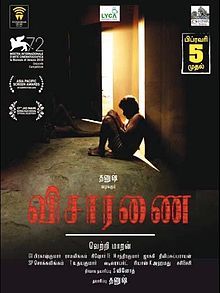
Generally, I do not appreciate too much violence on the screen. This time around, it was different. It was no torture porn, but it was necessary to inflict the correct emotion to the viewers.
This is no showcase drama of Indian culture or positive virtues but is a story that can happen anywhere in the world. Maybe the setting would not be the dirty back alleys of India or the unkempt dark skinned underprivileged Tamil labourers; the narration is the same. That, everyone, works for the System, and the System decides what is right and who is correct.
It does not matter how high you are in the social strata, how educated or how influential you think you can be, the System decides. Hey, this sounds almost like organised religion; everyone is same in the eyes of God, God is watching you, (bad) things just happens!
No matter what people say about the division of powers between the legislative, executive and judiciary arms to ensure check and balance, in practice money dictates everything. There can never be a stronger motivator in life than money. As the Tamil proverb says, "even a corpse would open its mouth at the mention of money"!
The whole system in corrupt. Even though there are "a few good men" are present, their hands are tied. The dilemma for them is between doing the right thing for the sake of the elusive Truth versus losing your daily bread. No amount of daily prayers is going to bring that square meal for him and his dependents. The System is so intertwined with our lives that it becomes indispensable and irremovable. Damn if you don't and damn if you do! Fight the System, you just lose, become another statistic and the System's work on Earth will go on, business as usual!
Just like the 2004 Boxing Day tsunami which jolted the pirate activities for a whole year, we need a major reshuffle and overhaul in the System to put in order. History, however, has shown that status quo soon reverts afterwards. A year after the tsunami, pirate started rearing their ugly flags, and it is business as usual for them after a little hiccoughs in the System!
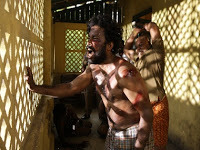 Visaranai is a gem which deservedly won accolades at the National level and had its premier screening at Venice Film Festival. It won the Amnesty International Award.
Visaranai is a gem which deservedly won accolades at the National level and had its premier screening at Venice Film Festival. It won the Amnesty International Award.
Four Tamil men (Pandi, Murugan, Afzal and Kumar) left the homes in Tamil Nadu after personal problems there. They found employment in a small Telugu speaking neighbourhood in Andhra Pradesh. Doing menial jobs, they live like vagabonds sleeping in the City Park.
One day, these four friends are picked by the Andhra Police, beaten up to a pulp to confess to a high-profile armed robbery at an officer's house. Everybody, including Pandi's employer, seems to be coaxing them to admit to a crime they know nothing. The junior police officers have to close the file as soon as possible as the pressure from the top. These unkempt homeless people from the lower class/caste seem easy targets. Pandi kind of becomes the de facto leader of the pack to deny charges. He blurts about the police brutality at his trial and is rescued by a Tamil Nadu police officer who happened to be there for another mission.
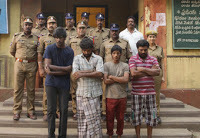 That moves the movie to the second part. The Tamil police officer, Muthuvel, is there to capture a go-between middle man, KK, who arranges deals for politicians. Obviously, KK is with the losing side, and he is witch-hunted by the police who acts as running dogs for the government of the day. The four friends go out of the way to help the Tamil policemen. They appear virtuous, unlike their Andhra counterparts. How wrong were they? Kumar, one of the four homeless guys, made it home, became an autorickshaw rider and lived to write his experience in Andhra Pradesh in a novel 'Lock-up' upon which this film is based. Kumar also made an appearance in Venice during the screening of this show. The others got embroiled in the police brutality all over again. They soon realised that even the white collared educated ones are not immune from the wheel of misfortune when it starts rolling.
That moves the movie to the second part. The Tamil police officer, Muthuvel, is there to capture a go-between middle man, KK, who arranges deals for politicians. Obviously, KK is with the losing side, and he is witch-hunted by the police who acts as running dogs for the government of the day. The four friends go out of the way to help the Tamil policemen. They appear virtuous, unlike their Andhra counterparts. How wrong were they? Kumar, one of the four homeless guys, made it home, became an autorickshaw rider and lived to write his experience in Andhra Pradesh in a novel 'Lock-up' upon which this film is based. Kumar also made an appearance in Venice during the screening of this show. The others got embroiled in the police brutality all over again. They soon realised that even the white collared educated ones are not immune from the wheel of misfortune when it starts rolling.
The characters who portray the role of law-enforcement officers are varied. Living to the proof of Milgram's experiments and Hannah Arendt's 'Banality of Evil', some of them just want to finish their assigned jobs and keep their bosses happy. Some are happy just to pass the buck to the other and absolve himself of any wrongdoings. One interesting old-timer is so well versed in how to do the dirty job that he had become so philosophical about it! He says, "....every life on Earth is precious. They should not die for nothing; their death could be used to write off certain cases!" when someone mentions that they should be just killed off. Muthuvel, the good cop, also to bow to the System to save his skin and job.
At the end of the movie, you are left with a bad after-taste and a nihilistic perception of our human race and its future generations to come. The message is clear. Every system that our ancestors started which seems to have been created to set order to the society is the very system that is eating it up. The story depicted here is not an outcome of somebody's wild imagination but is indeed the reality on the ground. The last scene of the film sums it up. A good cop is killed by his own man. The media is manipulated to gain sympathy for the family, make a martyr out of the officer and start a public debate on the appalling working conditions of policemen. The poor and the outcast die a worthless death until a social activist takes up the course.
Some memorable dialogues, (Translated)
http://.facebook.com/farouk.gulsara
Screenplay and Direction: Vettrimaaran

Generally, I do not appreciate too much violence on the screen. This time around, it was different. It was no torture porn, but it was necessary to inflict the correct emotion to the viewers.
This is no showcase drama of Indian culture or positive virtues but is a story that can happen anywhere in the world. Maybe the setting would not be the dirty back alleys of India or the unkempt dark skinned underprivileged Tamil labourers; the narration is the same. That, everyone, works for the System, and the System decides what is right and who is correct.
It does not matter how high you are in the social strata, how educated or how influential you think you can be, the System decides. Hey, this sounds almost like organised religion; everyone is same in the eyes of God, God is watching you, (bad) things just happens!
No matter what people say about the division of powers between the legislative, executive and judiciary arms to ensure check and balance, in practice money dictates everything. There can never be a stronger motivator in life than money. As the Tamil proverb says, "even a corpse would open its mouth at the mention of money"!
The whole system in corrupt. Even though there are "a few good men" are present, their hands are tied. The dilemma for them is between doing the right thing for the sake of the elusive Truth versus losing your daily bread. No amount of daily prayers is going to bring that square meal for him and his dependents. The System is so intertwined with our lives that it becomes indispensable and irremovable. Damn if you don't and damn if you do! Fight the System, you just lose, become another statistic and the System's work on Earth will go on, business as usual!
Just like the 2004 Boxing Day tsunami which jolted the pirate activities for a whole year, we need a major reshuffle and overhaul in the System to put in order. History, however, has shown that status quo soon reverts afterwards. A year after the tsunami, pirate started rearing their ugly flags, and it is business as usual for them after a little hiccoughs in the System!
 Visaranai is a gem which deservedly won accolades at the National level and had its premier screening at Venice Film Festival. It won the Amnesty International Award.
Visaranai is a gem which deservedly won accolades at the National level and had its premier screening at Venice Film Festival. It won the Amnesty International Award.Four Tamil men (Pandi, Murugan, Afzal and Kumar) left the homes in Tamil Nadu after personal problems there. They found employment in a small Telugu speaking neighbourhood in Andhra Pradesh. Doing menial jobs, they live like vagabonds sleeping in the City Park.
One day, these four friends are picked by the Andhra Police, beaten up to a pulp to confess to a high-profile armed robbery at an officer's house. Everybody, including Pandi's employer, seems to be coaxing them to admit to a crime they know nothing. The junior police officers have to close the file as soon as possible as the pressure from the top. These unkempt homeless people from the lower class/caste seem easy targets. Pandi kind of becomes the de facto leader of the pack to deny charges. He blurts about the police brutality at his trial and is rescued by a Tamil Nadu police officer who happened to be there for another mission.
 That moves the movie to the second part. The Tamil police officer, Muthuvel, is there to capture a go-between middle man, KK, who arranges deals for politicians. Obviously, KK is with the losing side, and he is witch-hunted by the police who acts as running dogs for the government of the day. The four friends go out of the way to help the Tamil policemen. They appear virtuous, unlike their Andhra counterparts. How wrong were they? Kumar, one of the four homeless guys, made it home, became an autorickshaw rider and lived to write his experience in Andhra Pradesh in a novel 'Lock-up' upon which this film is based. Kumar also made an appearance in Venice during the screening of this show. The others got embroiled in the police brutality all over again. They soon realised that even the white collared educated ones are not immune from the wheel of misfortune when it starts rolling.
That moves the movie to the second part. The Tamil police officer, Muthuvel, is there to capture a go-between middle man, KK, who arranges deals for politicians. Obviously, KK is with the losing side, and he is witch-hunted by the police who acts as running dogs for the government of the day. The four friends go out of the way to help the Tamil policemen. They appear virtuous, unlike their Andhra counterparts. How wrong were they? Kumar, one of the four homeless guys, made it home, became an autorickshaw rider and lived to write his experience in Andhra Pradesh in a novel 'Lock-up' upon which this film is based. Kumar also made an appearance in Venice during the screening of this show. The others got embroiled in the police brutality all over again. They soon realised that even the white collared educated ones are not immune from the wheel of misfortune when it starts rolling.The characters who portray the role of law-enforcement officers are varied. Living to the proof of Milgram's experiments and Hannah Arendt's 'Banality of Evil', some of them just want to finish their assigned jobs and keep their bosses happy. Some are happy just to pass the buck to the other and absolve himself of any wrongdoings. One interesting old-timer is so well versed in how to do the dirty job that he had become so philosophical about it! He says, "....every life on Earth is precious. They should not die for nothing; their death could be used to write off certain cases!" when someone mentions that they should be just killed off. Muthuvel, the good cop, also to bow to the System to save his skin and job.
At the end of the movie, you are left with a bad after-taste and a nihilistic perception of our human race and its future generations to come. The message is clear. Every system that our ancestors started which seems to have been created to set order to the society is the very system that is eating it up. The story depicted here is not an outcome of somebody's wild imagination but is indeed the reality on the ground. The last scene of the film sums it up. A good cop is killed by his own man. The media is manipulated to gain sympathy for the family, make a martyr out of the officer and start a public debate on the appalling working conditions of policemen. The poor and the outcast die a worthless death until a social activist takes up the course.
Some memorable dialogues, (Translated)
When you have money, you feel this quiet, inexplicable guilt...
All the religions in the world have taught us that money is evil.
Especially in a country like ours, where the majority are poverty stricken...
A rich man tends to look like a culprit.
Not just to the people, he feels that way about himself!
When that feeling becomes unbearable, he chooses to lose his money.
A man who doesn't feel guilty for his money, who respects the fruit of his labour...
Who doesn't feel ashamed, but understands that it's a token of appreciation...
will be rich.
One must never hide his wealth in guilt.
One must celebrate wealth!
Humans are the most responsible life form.http://asok22.wix.com/rifle-range-boy
Just like every birth has a purpose, so should every death.
When a life departs, it leaves a void in this world.
That void can never be filled by another.
That death should have a significance.
http://.facebook.com/farouk.gulsara

Published on June 27, 2016 09:08
June 25, 2016
Love fulfilled by time travel!
Somewhere in Time (1980)

In the Hindu Puranas, stories were told of people completing various lifeforms (karma cycles) through dreams. Through this process, kings change roles to become slaves or animals and endure punishment or pleasure.
Time travel films usually deploy complicated devices to get their characters move through timelines. Surprisingly, in this purely romantic drama, it is made simple. Self-hypnosis in the presence of ancient artefacts is suggested as the way transport one back to the past.
Christopher Reeve (known for his role as Superman) plays the role of a playwriter, Richard Coulier. At a time when he gets a writer's block, he drives around aimlessly and ends up staying in a grand old hotel. He is drawn into the intriguing world of time travel after being fascinated with a portrait of a stage actress (the Queen of mini-series of the 80s, Jane Seymour as Miss Elise McKenna). He remembers receiving an old pocket watch 8 years previously from a mysterious lady whom he later found to be Ms McKenna herself, through his investigations.
After consulting a professor about time travel through hypnosis, Coullier transports himself back to 1912. He falls in love with Ms McKenna who is tightly guarded like a hawk by her manager, Robinson (Christopher Plummet, from Sound of Music). This love bubble burst when Coullier accidentally draws a 1979 coin from his coat pocket!
It is sad to see the hunk of Christopher Reeve ambulant. As we remember, he spent his later part of his life as a quadriplegic after sustaining a neck fracture following a horse riding accident. All the stem cell research and campaigns that he helped to be made aware, did not help him to recover. Sad.
N.B. The original Jane Seymour was King Henry the VIII's third wife whom he courted soon after his court passed the death sentence on his second wife, Queen Anne Boleyn, for conspiracy and infidelity. Queen Jane Seymour provided the only male heir but she died after childbirth. The offspring later ascended the throne as King Edward VI.http://asok22.wix.com/rifle-range-boy
http://.facebook.com/farouk.gulsara

In the Hindu Puranas, stories were told of people completing various lifeforms (karma cycles) through dreams. Through this process, kings change roles to become slaves or animals and endure punishment or pleasure.
Time travel films usually deploy complicated devices to get their characters move through timelines. Surprisingly, in this purely romantic drama, it is made simple. Self-hypnosis in the presence of ancient artefacts is suggested as the way transport one back to the past.
Christopher Reeve (known for his role as Superman) plays the role of a playwriter, Richard Coulier. At a time when he gets a writer's block, he drives around aimlessly and ends up staying in a grand old hotel. He is drawn into the intriguing world of time travel after being fascinated with a portrait of a stage actress (the Queen of mini-series of the 80s, Jane Seymour as Miss Elise McKenna). He remembers receiving an old pocket watch 8 years previously from a mysterious lady whom he later found to be Ms McKenna herself, through his investigations.
After consulting a professor about time travel through hypnosis, Coullier transports himself back to 1912. He falls in love with Ms McKenna who is tightly guarded like a hawk by her manager, Robinson (Christopher Plummet, from Sound of Music). This love bubble burst when Coullier accidentally draws a 1979 coin from his coat pocket!
It is sad to see the hunk of Christopher Reeve ambulant. As we remember, he spent his later part of his life as a quadriplegic after sustaining a neck fracture following a horse riding accident. All the stem cell research and campaigns that he helped to be made aware, did not help him to recover. Sad.
N.B. The original Jane Seymour was King Henry the VIII's third wife whom he courted soon after his court passed the death sentence on his second wife, Queen Anne Boleyn, for conspiracy and infidelity. Queen Jane Seymour provided the only male heir but she died after childbirth. The offspring later ascended the throne as King Edward VI.http://asok22.wix.com/rifle-range-boy
http://.facebook.com/farouk.gulsara

Published on June 25, 2016 14:01
The evil that lurks in you.
Antichrist (2009)
Screenplay, Director: Lars Von Tiers
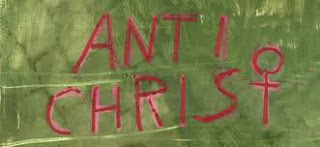 One is quick to find a punching back, a casual link to all our maladies. They hurl brickbats at others, nature, animals, bad times and bad omen as a reason of their predicaments. If nothing can be definitely pinpointed, genetics and nurturing take the beating. The actual evil of the world, according to this film, is none of the above but is buried deep within all of us. Yes, the animalistic, raw, unbridled desires in us are the culprits! We can blame all the evil that happens to us upon ourselves, not our parents or our siblings.
One is quick to find a punching back, a casual link to all our maladies. They hurl brickbats at others, nature, animals, bad times and bad omen as a reason of their predicaments. If nothing can be definitely pinpointed, genetics and nurturing take the beating. The actual evil of the world, according to this film, is none of the above but is buried deep within all of us. Yes, the animalistic, raw, unbridled desires in us are the culprits! We can blame all the evil that happens to us upon ourselves, not our parents or our siblings.
This somehow graphic and gory presentation takes us through the journey of a psychotherapist and his wife. The wife is grieved by the death of her toddler. The child fell to her death whilst she and her husband were engaged in a passionate act of love making. The guilt of neglect and joy at an emotional moment dragged her into depression. The medications do not seem to be working; it only leaves her drugged and lethargic with no light at the end of the tunnel.
That is when the psychotherapist husband (Willem Dafoe) takes the matter into his own hands. He made the cardinal mistake of treating his own kin, his wife (Charlotte Gainsbourg, a regular in many Von Tiers' movies). Their journey leads to dangerous areas of the human psyche, the woods, their summer cabin and a gory rollercoaster of violence and killing using Christian symbolisms in its background. It is the first of Von Tier's 'Depression Trilogy'.
Not quite the movie for weak hearted and those who wish to see no evil!
P/S., Are we all wired up to feel guilty of our actions? We are conditioned to do certain things in life. We are told that that is the right thing to do. It may also be the only way to do. Hence, when we deviate from our self-defined boundaries of goodness and the outcome of the occurrence plays against our liking, we make ourselves feel guilty. This surmounted heap of unfilled 'sin' creeps deep into our psyche and pushes the body to the dark side. Interestingly, the crow which is denigrated in the Christian myths to signify evil of the mind is venerated in many other cultures including the Red Indians, Celtic, Germanic and Hindu folks for its sharp-mindedness, ability to foresee the future and its role as an intermediary to the netherworld! http://asok22.wix.com/rifle-range-boy
http://.facebook.com/farouk.gulsara
Screenplay, Director: Lars Von Tiers
 One is quick to find a punching back, a casual link to all our maladies. They hurl brickbats at others, nature, animals, bad times and bad omen as a reason of their predicaments. If nothing can be definitely pinpointed, genetics and nurturing take the beating. The actual evil of the world, according to this film, is none of the above but is buried deep within all of us. Yes, the animalistic, raw, unbridled desires in us are the culprits! We can blame all the evil that happens to us upon ourselves, not our parents or our siblings.
One is quick to find a punching back, a casual link to all our maladies. They hurl brickbats at others, nature, animals, bad times and bad omen as a reason of their predicaments. If nothing can be definitely pinpointed, genetics and nurturing take the beating. The actual evil of the world, according to this film, is none of the above but is buried deep within all of us. Yes, the animalistic, raw, unbridled desires in us are the culprits! We can blame all the evil that happens to us upon ourselves, not our parents or our siblings.This somehow graphic and gory presentation takes us through the journey of a psychotherapist and his wife. The wife is grieved by the death of her toddler. The child fell to her death whilst she and her husband were engaged in a passionate act of love making. The guilt of neglect and joy at an emotional moment dragged her into depression. The medications do not seem to be working; it only leaves her drugged and lethargic with no light at the end of the tunnel.
That is when the psychotherapist husband (Willem Dafoe) takes the matter into his own hands. He made the cardinal mistake of treating his own kin, his wife (Charlotte Gainsbourg, a regular in many Von Tiers' movies). Their journey leads to dangerous areas of the human psyche, the woods, their summer cabin and a gory rollercoaster of violence and killing using Christian symbolisms in its background. It is the first of Von Tier's 'Depression Trilogy'.
Not quite the movie for weak hearted and those who wish to see no evil!
P/S., Are we all wired up to feel guilty of our actions? We are conditioned to do certain things in life. We are told that that is the right thing to do. It may also be the only way to do. Hence, when we deviate from our self-defined boundaries of goodness and the outcome of the occurrence plays against our liking, we make ourselves feel guilty. This surmounted heap of unfilled 'sin' creeps deep into our psyche and pushes the body to the dark side. Interestingly, the crow which is denigrated in the Christian myths to signify evil of the mind is venerated in many other cultures including the Red Indians, Celtic, Germanic and Hindu folks for its sharp-mindedness, ability to foresee the future and its role as an intermediary to the netherworld! http://asok22.wix.com/rifle-range-boy
http://.facebook.com/farouk.gulsara

Published on June 25, 2016 09:30
June 24, 2016
More questions, not answers!
Mulholland Drive (2001)
Story and Direction: David Lynch
I remember my school teacher telling the class a story about art and artists. A painter once smeared paint over his toddler's bare buttock. He then made him sit a white sheet of paper. What resulted was the silhouette of a perfectly shaped apple. He went on to exhibit his masterpiece which spurred rave reviews and stimulated great literary discourses. What he was trying to say was that behind a masterpiece, there is a story and that sometimes people are fooled by artists!
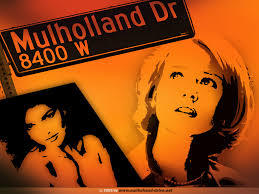 I watched this David Lynch's film with the same thought. This movie was initially intended to be a pilot for a TV series. Unfortunately, it was rejected by the TV company, but they decided to make out a feature film out of it. I think that is why there are many unrelated gaps and seemingly unrelated characters infused into the story. Or am I missing something? Still, these are very reasons this film attracts many interests, spurned multiple viewings and appreciated as a symbolism to our modern daily lives - so multilayered, an enigma, filled with mysteries and role reversals. The two disjointed parts of the movie are viewed as parallel stories, one in real life and the other in a dream but which is which, the first or the second? Maybe it is just the pilot was made with the subplots within which had to be trimmed away to cut into a 2-hour plus offering. Perhaps, it was intentionally left behind to give the flick a noir feel to it.
I watched this David Lynch's film with the same thought. This movie was initially intended to be a pilot for a TV series. Unfortunately, it was rejected by the TV company, but they decided to make out a feature film out of it. I think that is why there are many unrelated gaps and seemingly unrelated characters infused into the story. Or am I missing something? Still, these are very reasons this film attracts many interests, spurned multiple viewings and appreciated as a symbolism to our modern daily lives - so multilayered, an enigma, filled with mysteries and role reversals. The two disjointed parts of the movie are viewed as parallel stories, one in real life and the other in a dream but which is which, the first or the second? Maybe it is just the pilot was made with the subplots within which had to be trimmed away to cut into a 2-hour plus offering. Perhaps, it was intentionally left behind to give the flick a noir feel to it.
A happy goody two shoes Betty (Naomi) arrives in LA, hoping to hit it big in Hollywood. She comes to stay with her aunt's home, herself an established artist but is away on a trip. Just a hill away, a lady is attempted to be murdered by hoodlums but by a twist of fate, the car he is travelling in is hit by racing teenagers. The assailants are killed, but she escapes unscathed. She roams aimlessly amnesiac and lands in the same apartment that Betty stays.
That starts the cat-and-mouse routine which tries to establish the lady's identity while Betty attends her acting audition. It gets more intriguing when the woman, now calls herself Rita (after seeing Rita Hayworth's poster) has flashes of memory coming back. It becomes even murkier when a dead body turns up, and they land up in a Spanish speaking past midnight theatre where the performers perform brilliantly only to be found out to be lip-syncing! One has to watch it make his own impression. One will be left with more questions, not answers. http://asok22.wix.com/rifle-range-boy
http://.facebook.com/farouk.gulsara
Story and Direction: David Lynch
I remember my school teacher telling the class a story about art and artists. A painter once smeared paint over his toddler's bare buttock. He then made him sit a white sheet of paper. What resulted was the silhouette of a perfectly shaped apple. He went on to exhibit his masterpiece which spurred rave reviews and stimulated great literary discourses. What he was trying to say was that behind a masterpiece, there is a story and that sometimes people are fooled by artists!
 I watched this David Lynch's film with the same thought. This movie was initially intended to be a pilot for a TV series. Unfortunately, it was rejected by the TV company, but they decided to make out a feature film out of it. I think that is why there are many unrelated gaps and seemingly unrelated characters infused into the story. Or am I missing something? Still, these are very reasons this film attracts many interests, spurned multiple viewings and appreciated as a symbolism to our modern daily lives - so multilayered, an enigma, filled with mysteries and role reversals. The two disjointed parts of the movie are viewed as parallel stories, one in real life and the other in a dream but which is which, the first or the second? Maybe it is just the pilot was made with the subplots within which had to be trimmed away to cut into a 2-hour plus offering. Perhaps, it was intentionally left behind to give the flick a noir feel to it.
I watched this David Lynch's film with the same thought. This movie was initially intended to be a pilot for a TV series. Unfortunately, it was rejected by the TV company, but they decided to make out a feature film out of it. I think that is why there are many unrelated gaps and seemingly unrelated characters infused into the story. Or am I missing something? Still, these are very reasons this film attracts many interests, spurned multiple viewings and appreciated as a symbolism to our modern daily lives - so multilayered, an enigma, filled with mysteries and role reversals. The two disjointed parts of the movie are viewed as parallel stories, one in real life and the other in a dream but which is which, the first or the second? Maybe it is just the pilot was made with the subplots within which had to be trimmed away to cut into a 2-hour plus offering. Perhaps, it was intentionally left behind to give the flick a noir feel to it.A happy goody two shoes Betty (Naomi) arrives in LA, hoping to hit it big in Hollywood. She comes to stay with her aunt's home, herself an established artist but is away on a trip. Just a hill away, a lady is attempted to be murdered by hoodlums but by a twist of fate, the car he is travelling in is hit by racing teenagers. The assailants are killed, but she escapes unscathed. She roams aimlessly amnesiac and lands in the same apartment that Betty stays.
That starts the cat-and-mouse routine which tries to establish the lady's identity while Betty attends her acting audition. It gets more intriguing when the woman, now calls herself Rita (after seeing Rita Hayworth's poster) has flashes of memory coming back. It becomes even murkier when a dead body turns up, and they land up in a Spanish speaking past midnight theatre where the performers perform brilliantly only to be found out to be lip-syncing! One has to watch it make his own impression. One will be left with more questions, not answers. http://asok22.wix.com/rifle-range-boy
http://.facebook.com/farouk.gulsara

Published on June 24, 2016 09:05
June 23, 2016
Hero or villain?
BBC Four. Genius of the Modern World, Karl Marx (2016)
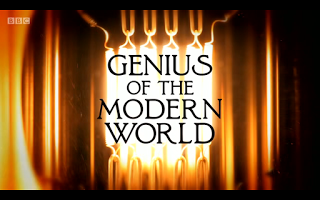
He is honoured as one of the greatest thinkers of the modern world together with Nietzsche and Freud. Their ideas came about at a time when the whole world was changing, pre-existing economic models were crumbling, science was changing religious beliefs and people started developing new ideas about life.
In the first of the three episodes, a historian Bettany Hughes tells us the life and times of a 20th-century icon whose idea rocked the world for a good part of the century, Karl Marx (1818-1883).
It is interesting to note that he did not invent Communism. Communism predates his ideas. He got his inspirations from the young Hegelian movement at the University of Berlin and the French Revolution. Growing in a society controlled by the aristocratic Prussian rulers who discriminate his background as a Jew, he postulated that capitalism was a self-defeating and an exploitative system that makes everybody unhappy in the end. The whole basis of capitalism is to fail and to squeeze the workers to maximise profit for the ruling class.

 Religion is used as a tool to manipulate the minds of the masses. It retards our real potential. It is opium for the people, a painkiller for something deep rooted.
Religion is used as a tool to manipulate the minds of the masses. It retards our real potential. It is opium for the people, a painkiller for something deep rooted.
Unable to get a job in academia due to his harsh criticisms of the Prussian ruling class, journalism was his tool to propagate his ideas with the help of Engels, the son of a capitalistic industrialist from Manchester. He did not claim to be the guru to the answers in life but was a critical analyser of everything that was wrong in modern capitalism. Man's creativity is retarded by mundane, repetitive jobs chained into the production chain. Unlike machines or animal, he can be creative. Bees can only make honey, birds nest but man can make whatever he wants. He admits that the bourgeoisies have shown their might via their mammoth projects, cannot even be rivalled by the mighty Egyptian and Roman civilisations. The rich can move mountains.
A person only needs to work so much to sustain his existence. For the rest of time, he should spend his time doing the things that he likes like fishing, hunting, drinking wine and spend time with friends. We are required much more than we are required. The surplus value of work is the profit that is extracted from the exploitation of the working class.
For most of human civilisation, there have been haves and have nots, through the cooperative society, medieval feudalism and authoritarian rule but in capitalism, the divide is getting wider as industries prosper. The frequent recurrent cycles of ups and down make capitalism an unstable system.
The woes of the society are due to production issues. The capitalist owners are also caught in this quagmire. They cannot cut working hours as it would mean losing to competitors and loss of profit and potentially go bust. The law, religion, culture and arts are exploited by the powers that be to maintain status quo. In our pursuit of happiness, we have created a monster that controls us.
He suggests that the soul would reach perfection by embedding itself in the heart of the society. He did not, however, live to what he preached. Unlike people like Trotsky and Gandhi, who lived the life that they advocated, Marx, even though he wrote about the plight of the proletarians, he lived a relatively bourgeoise one most of his life.
Marx suffered from a debilitating medical condition, probably, hyderanitis suppuritiva which is a chronic inflammatory scarring condition of the sweat glands. He lost three of his children to illness. His lowest ebb in life must have been when he fathered a love child with his home helper especially when his wife, Jenny was too! Every hero has a weak point but in came his friend, Engels, to take the rap. Only eleven mourners turned out at his funeral.
Correctly or not, his writings through his publications, namely 'Communist Manifesto' and 'Das Kapital', were manipulated by people with self-serving intentions to be used as a blueprint for the subsequent communist states like the Soviet Union and China. The experiment apparently proved to be disastrous, causing loss of lives to famine, torture and the detention camps. The collapse of the fall of the Berlin Wall is evidence of another failure of yet another economic model. Marx had created a monster just like how he referred to capitalism.
In the wake of recurrent economic collapse around the world, capitalism is also reevaluated, and Marxian thoughts are given a second thought.
http://asok22.wix.com/rifle-range-boy
http://.facebook.com/farouk.gulsara

He is honoured as one of the greatest thinkers of the modern world together with Nietzsche and Freud. Their ideas came about at a time when the whole world was changing, pre-existing economic models were crumbling, science was changing religious beliefs and people started developing new ideas about life.
In the first of the three episodes, a historian Bettany Hughes tells us the life and times of a 20th-century icon whose idea rocked the world for a good part of the century, Karl Marx (1818-1883).
It is interesting to note that he did not invent Communism. Communism predates his ideas. He got his inspirations from the young Hegelian movement at the University of Berlin and the French Revolution. Growing in a society controlled by the aristocratic Prussian rulers who discriminate his background as a Jew, he postulated that capitalism was a self-defeating and an exploitative system that makes everybody unhappy in the end. The whole basis of capitalism is to fail and to squeeze the workers to maximise profit for the ruling class.

 Religion is used as a tool to manipulate the minds of the masses. It retards our real potential. It is opium for the people, a painkiller for something deep rooted.
Religion is used as a tool to manipulate the minds of the masses. It retards our real potential. It is opium for the people, a painkiller for something deep rooted.Unable to get a job in academia due to his harsh criticisms of the Prussian ruling class, journalism was his tool to propagate his ideas with the help of Engels, the son of a capitalistic industrialist from Manchester. He did not claim to be the guru to the answers in life but was a critical analyser of everything that was wrong in modern capitalism. Man's creativity is retarded by mundane, repetitive jobs chained into the production chain. Unlike machines or animal, he can be creative. Bees can only make honey, birds nest but man can make whatever he wants. He admits that the bourgeoisies have shown their might via their mammoth projects, cannot even be rivalled by the mighty Egyptian and Roman civilisations. The rich can move mountains.
A person only needs to work so much to sustain his existence. For the rest of time, he should spend his time doing the things that he likes like fishing, hunting, drinking wine and spend time with friends. We are required much more than we are required. The surplus value of work is the profit that is extracted from the exploitation of the working class.
For most of human civilisation, there have been haves and have nots, through the cooperative society, medieval feudalism and authoritarian rule but in capitalism, the divide is getting wider as industries prosper. The frequent recurrent cycles of ups and down make capitalism an unstable system.
The woes of the society are due to production issues. The capitalist owners are also caught in this quagmire. They cannot cut working hours as it would mean losing to competitors and loss of profit and potentially go bust. The law, religion, culture and arts are exploited by the powers that be to maintain status quo. In our pursuit of happiness, we have created a monster that controls us.
He suggests that the soul would reach perfection by embedding itself in the heart of the society. He did not, however, live to what he preached. Unlike people like Trotsky and Gandhi, who lived the life that they advocated, Marx, even though he wrote about the plight of the proletarians, he lived a relatively bourgeoise one most of his life.
Marx suffered from a debilitating medical condition, probably, hyderanitis suppuritiva which is a chronic inflammatory scarring condition of the sweat glands. He lost three of his children to illness. His lowest ebb in life must have been when he fathered a love child with his home helper especially when his wife, Jenny was too! Every hero has a weak point but in came his friend, Engels, to take the rap. Only eleven mourners turned out at his funeral.
Correctly or not, his writings through his publications, namely 'Communist Manifesto' and 'Das Kapital', were manipulated by people with self-serving intentions to be used as a blueprint for the subsequent communist states like the Soviet Union and China. The experiment apparently proved to be disastrous, causing loss of lives to famine, torture and the detention camps. The collapse of the fall of the Berlin Wall is evidence of another failure of yet another economic model. Marx had created a monster just like how he referred to capitalism.
In the wake of recurrent economic collapse around the world, capitalism is also reevaluated, and Marxian thoughts are given a second thought.
http://asok22.wix.com/rifle-range-boy
http://.facebook.com/farouk.gulsara

Published on June 23, 2016 09:30
June 22, 2016
Live life as you deem fit?
Nymphomaniac Vol 1 and 2 (2013)
Director, Screenplay: Lars Von Tier
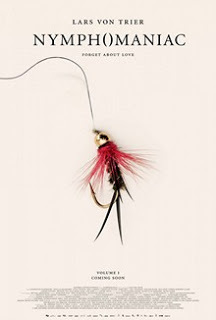 Humans demand that it is their birthright to demand their pleasures. It is one's fundamental necessity to live a fulfilled life where it is filled with various pleasures. After all, they say, you only live once. You are only given the opportunity to live once. You are supposed to live to the fullest. You should go the whole 9 yards to make it a reality. And you blame all your future failures and underachievement to these unfulfillments. Somehow, it seems legitimate to holds others responsible for your existence accountable to your follies. The fault is anybody's except yours.
Humans demand that it is their birthright to demand their pleasures. It is one's fundamental necessity to live a fulfilled life where it is filled with various pleasures. After all, they say, you only live once. You are only given the opportunity to live once. You are supposed to live to the fullest. You should go the whole 9 yards to make it a reality. And you blame all your future failures and underachievement to these unfulfillments. Somehow, it seems legitimate to holds others responsible for your existence accountable to your follies. The fault is anybody's except yours.
On the other end, another group would argue that life on earth is torture. Our time here is an opportunity to serve and gain merit points for an eternal afterlife. They live by preset rules, suppressing their innate desires that they perceive every temptation as a test of virtue from the dark side to commit sin.
This 5-hour presentation by an eccentric director is a graphic representation of a life of a sex addict. It is told in the form of a narration by a battered lady who was rescued at an alley by a recluse mmiddle-agedsexually shy intellect. As she gains strength, with a hot cup od milked tea, she tells her life story. Both of them try to analyse her actions as she narrates the nitty gritty deatils of her childhood, adolescence, sexual escapades and the collapse of her life. The intellect attempts to analyse her actions and inactions from a philosophical and anthropomorphical angles whilst she tries to justify hers.
This film forms part of the director's famed 'Depression trilogy'; the other two being 'Melancholia' and 'Antichrist'.http://asok22.wix.com/rifle-range-boy
http://.facebook.com/farouk.gulsara
Director, Screenplay: Lars Von Tier
 Humans demand that it is their birthright to demand their pleasures. It is one's fundamental necessity to live a fulfilled life where it is filled with various pleasures. After all, they say, you only live once. You are only given the opportunity to live once. You are supposed to live to the fullest. You should go the whole 9 yards to make it a reality. And you blame all your future failures and underachievement to these unfulfillments. Somehow, it seems legitimate to holds others responsible for your existence accountable to your follies. The fault is anybody's except yours.
Humans demand that it is their birthright to demand their pleasures. It is one's fundamental necessity to live a fulfilled life where it is filled with various pleasures. After all, they say, you only live once. You are only given the opportunity to live once. You are supposed to live to the fullest. You should go the whole 9 yards to make it a reality. And you blame all your future failures and underachievement to these unfulfillments. Somehow, it seems legitimate to holds others responsible for your existence accountable to your follies. The fault is anybody's except yours.On the other end, another group would argue that life on earth is torture. Our time here is an opportunity to serve and gain merit points for an eternal afterlife. They live by preset rules, suppressing their innate desires that they perceive every temptation as a test of virtue from the dark side to commit sin.
This 5-hour presentation by an eccentric director is a graphic representation of a life of a sex addict. It is told in the form of a narration by a battered lady who was rescued at an alley by a recluse mmiddle-agedsexually shy intellect. As she gains strength, with a hot cup od milked tea, she tells her life story. Both of them try to analyse her actions as she narrates the nitty gritty deatils of her childhood, adolescence, sexual escapades and the collapse of her life. The intellect attempts to analyse her actions and inactions from a philosophical and anthropomorphical angles whilst she tries to justify hers.
This film forms part of the director's famed 'Depression trilogy'; the other two being 'Melancholia' and 'Antichrist'.http://asok22.wix.com/rifle-range-boy
http://.facebook.com/farouk.gulsara

Published on June 22, 2016 09:30
June 21, 2016
Another swipe at capitalism?
Babu (பாபு, Tamil; 1971)
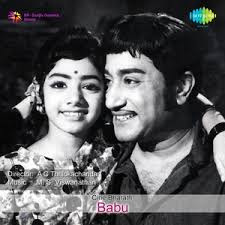
I remember this movie as the one that we, in our childhood, could not watch as our annual Deepavali film. Amma was disappointed when we could not get the tickets and had to watch something else instead. Many of its songs used to fill the airwaves regularly and one of the songs, 'Kanji Varuthappa', was a hit during Thaipusam at the refreshment stalls before movie songs were banned by the Thaipusam organising committees. Even though the song talks about the various avatars of Lakshmi and their roles, there is the uneasy colloquial association of kanji (broth) and vanji (woman) in the same sentence!
At one look, one can easily see that it see of its socialistic-communistic leanings. The story, written by a writer from Kerala, argues about the actual meaning of divinity as well as the division of classes. It tries to wake the general public from the slumber that God paves the way for us to follow. We are masters of our destiny.
The signature tune of this film, 'Itho Enthan Deivam Munnale' (Here in front of me is God), tries to tell the audience that God lives in simple things in life. You see Him in the innocent smile of a child and in a compassionate gaze of a philanthropist. He lives in the heart of the kind individuals.
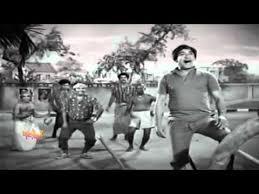 A clip from the song 'Kanji Varuthappa'.The lyrics suggest that food unites all of us. Because of societal pressures, the Brahmin avoids the prawn in the Christian missionary's tiffin. The Hindu priest gets upset when the meat eater's gravy somehow mixes with his but he likes it, even though he shows his resentment!His Grace is seen in the blossom of a flower, the fragrance of bloom, creepy crawlies and the quenching flow of the river. One attains divinity through education. Wealth is in performing public service. Joy is in uplifting others and seeing the smile of a downtrodden. Herein lies God! Our life is in our toil and sweat. What else could this sound like but a communist propaganda?
A clip from the song 'Kanji Varuthappa'.The lyrics suggest that food unites all of us. Because of societal pressures, the Brahmin avoids the prawn in the Christian missionary's tiffin. The Hindu priest gets upset when the meat eater's gravy somehow mixes with his but he likes it, even though he shows his resentment!His Grace is seen in the blossom of a flower, the fragrance of bloom, creepy crawlies and the quenching flow of the river. One attains divinity through education. Wealth is in performing public service. Joy is in uplifting others and seeing the smile of a downtrodden. Herein lies God! Our life is in our toil and sweat. What else could this sound like but a communist propaganda?
Babu grew up as a rough and tough kid on the street. Despite his tough exterior, he is tender on the inside, ever to help out a soul in need. By circumstance, he takes the job of a rickshaw puller in his adulthood. [In the socialist circle, the position of a rickshaw puller must be the epitome of abuse of human labour; the well-to-do, by virtue of their wealth and subsequent upliftment of class can easily buy the toil and sweat of a poor.]
The other main characters comprise his confidante, a religious restauranteur (VK Ramasamy) who looks up to him and after him; a ruthless but comical moneylender (MRR Vasu); his fellow rickshaw puller (Nagesh) and a kind liberal minded wealthy contractor who gave Babu shelter and a warm meal (Balaji).
Babu was pleasantly surprised that someone well-to-do could be so kind as to give him due recognition as a human being that he becomes eternal loyal to him like a guard dog.
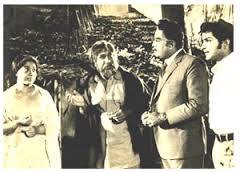 Two families of different classes join;the industrialist and the labourer.After serving time for murdering the killer of his sweetheart, he is shocked to see the contractor's daughter (a very young Sridevi) begging for food. For the single kindness that her deceased father had given him, Babu decides to make it his lifetime duty to support the contractor's widow (Sowkar Janaki). Understanding the importance of education, he educates her with his meagre income.
Two families of different classes join;the industrialist and the labourer.After serving time for murdering the killer of his sweetheart, he is shocked to see the contractor's daughter (a very young Sridevi) begging for food. For the single kindness that her deceased father had given him, Babu decides to make it his lifetime duty to support the contractor's widow (Sowkar Janaki). Understanding the importance of education, he educates her with his meagre income.
As the child grows older with the company that she keeps in her convent school, she is embarrassed by the man who singlehandedly rose her from the pits. Over the years, the rift grows but finally life knocks sense into her. She graduates from university and marries a man of her liking, after a little glitch with his high social status.
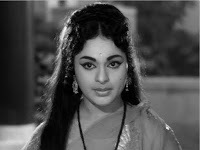 Vijayasree
Vijayasree
Money and accumulation of wealth are portrayed as a bad thing here. The urge to be chasing after affluence is frowned upon. The pursuit of education for self-development and empowerment of the society is revered, not for selfish self-interest.
A little trivia here. Vijayasree, who made a brief appearance as Babu's love interest before being killed off, is a sultry actress from the Malayalam cinema. She had made quite an impact there and was labelled as the Marilyn Monroe of the East for her vivaciousness. Sadly, her short career ended prematurely at 21 years of age when she committed suicide.
http://asok22.wix.com/rifle-range-boy
http://.facebook.com/farouk.gulsara

I remember this movie as the one that we, in our childhood, could not watch as our annual Deepavali film. Amma was disappointed when we could not get the tickets and had to watch something else instead. Many of its songs used to fill the airwaves regularly and one of the songs, 'Kanji Varuthappa', was a hit during Thaipusam at the refreshment stalls before movie songs were banned by the Thaipusam organising committees. Even though the song talks about the various avatars of Lakshmi and their roles, there is the uneasy colloquial association of kanji (broth) and vanji (woman) in the same sentence!
At one look, one can easily see that it see of its socialistic-communistic leanings. The story, written by a writer from Kerala, argues about the actual meaning of divinity as well as the division of classes. It tries to wake the general public from the slumber that God paves the way for us to follow. We are masters of our destiny.
The signature tune of this film, 'Itho Enthan Deivam Munnale' (Here in front of me is God), tries to tell the audience that God lives in simple things in life. You see Him in the innocent smile of a child and in a compassionate gaze of a philanthropist. He lives in the heart of the kind individuals.
 A clip from the song 'Kanji Varuthappa'.The lyrics suggest that food unites all of us. Because of societal pressures, the Brahmin avoids the prawn in the Christian missionary's tiffin. The Hindu priest gets upset when the meat eater's gravy somehow mixes with his but he likes it, even though he shows his resentment!His Grace is seen in the blossom of a flower, the fragrance of bloom, creepy crawlies and the quenching flow of the river. One attains divinity through education. Wealth is in performing public service. Joy is in uplifting others and seeing the smile of a downtrodden. Herein lies God! Our life is in our toil and sweat. What else could this sound like but a communist propaganda?
A clip from the song 'Kanji Varuthappa'.The lyrics suggest that food unites all of us. Because of societal pressures, the Brahmin avoids the prawn in the Christian missionary's tiffin. The Hindu priest gets upset when the meat eater's gravy somehow mixes with his but he likes it, even though he shows his resentment!His Grace is seen in the blossom of a flower, the fragrance of bloom, creepy crawlies and the quenching flow of the river. One attains divinity through education. Wealth is in performing public service. Joy is in uplifting others and seeing the smile of a downtrodden. Herein lies God! Our life is in our toil and sweat. What else could this sound like but a communist propaganda?Babu grew up as a rough and tough kid on the street. Despite his tough exterior, he is tender on the inside, ever to help out a soul in need. By circumstance, he takes the job of a rickshaw puller in his adulthood. [In the socialist circle, the position of a rickshaw puller must be the epitome of abuse of human labour; the well-to-do, by virtue of their wealth and subsequent upliftment of class can easily buy the toil and sweat of a poor.]
The other main characters comprise his confidante, a religious restauranteur (VK Ramasamy) who looks up to him and after him; a ruthless but comical moneylender (MRR Vasu); his fellow rickshaw puller (Nagesh) and a kind liberal minded wealthy contractor who gave Babu shelter and a warm meal (Balaji).
Babu was pleasantly surprised that someone well-to-do could be so kind as to give him due recognition as a human being that he becomes eternal loyal to him like a guard dog.
 Two families of different classes join;the industrialist and the labourer.After serving time for murdering the killer of his sweetheart, he is shocked to see the contractor's daughter (a very young Sridevi) begging for food. For the single kindness that her deceased father had given him, Babu decides to make it his lifetime duty to support the contractor's widow (Sowkar Janaki). Understanding the importance of education, he educates her with his meagre income.
Two families of different classes join;the industrialist and the labourer.After serving time for murdering the killer of his sweetheart, he is shocked to see the contractor's daughter (a very young Sridevi) begging for food. For the single kindness that her deceased father had given him, Babu decides to make it his lifetime duty to support the contractor's widow (Sowkar Janaki). Understanding the importance of education, he educates her with his meagre income.As the child grows older with the company that she keeps in her convent school, she is embarrassed by the man who singlehandedly rose her from the pits. Over the years, the rift grows but finally life knocks sense into her. She graduates from university and marries a man of her liking, after a little glitch with his high social status.
 Vijayasree
VijayasreeMoney and accumulation of wealth are portrayed as a bad thing here. The urge to be chasing after affluence is frowned upon. The pursuit of education for self-development and empowerment of the society is revered, not for selfish self-interest.
A little trivia here. Vijayasree, who made a brief appearance as Babu's love interest before being killed off, is a sultry actress from the Malayalam cinema. She had made quite an impact there and was labelled as the Marilyn Monroe of the East for her vivaciousness. Sadly, her short career ended prematurely at 21 years of age when she committed suicide.
http://asok22.wix.com/rifle-range-boy
http://.facebook.com/farouk.gulsara

Published on June 21, 2016 09:01
June 20, 2016
This could be our last song!
Dancer in the Dark (2000)
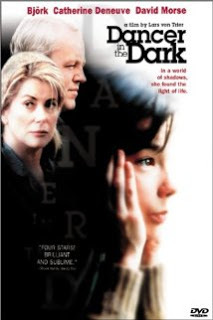 Director: Lars von Trier
Director: Lars von Trier
The plot of this film may be all too familiar to followers of Indian cinema. Stories of self-sacrifice, white lies and concealment of the truth to protect the greater truth are all too common. In the western world, this type of pictures would make it to Cannes and earn many accolades! There were too many loopholes in the story to be taken seriously, hence the mixed response at its premiere screening; it was booed and clapped simultaneously. Mainly because it was set in the early 60s USA and Björk (the Icelandic smiley superstar) did the music score and the acting, it was given a second lease of life.
Björk acts a Czechoslovakian immigrant, Selma Ježková, a single mother with a preteen son. She works in a factory making sinks and secretly holds a secret tightly to her chest. Selma has a hereditary degenerative eye disease which is slowly making her blind. She realises that it is just a matter of time before she becomes completely blind and gets sacked from her job. She is doing an extra job just to ensure that she saves enough money for her son's eye operation before the disease afflicts him too.
 BjörkSelma and her son stay in a rented trailer. The landlord and his wife have a cordial relationship with Selma. Selma is a dreamer, plays music in her head and tries to take part in a musical. The landlord, a police officer, even though outwardly appears self-sufficient, is actually in dire straits because of his spendthrift wife. In desperation, he steals Selma's savings. A confrontation ensues, and the police officer is mortally wounded.
BjörkSelma and her son stay in a rented trailer. The landlord and his wife have a cordial relationship with Selma. Selma is a dreamer, plays music in her head and tries to take part in a musical. The landlord, a police officer, even though outwardly appears self-sufficient, is actually in dire straits because of his spendthrift wife. In desperation, he steals Selma's savings. A confrontation ensues, and the police officer is mortally wounded.
The rest of the movie dwells with Selma in court facing the noose and she being a sacrificial lamb just so that the son can see his grandchildren.
As awkward as it may sound, this seemingly heavy drama is actually a musical! Every now and then, even in the height of suspense, the cast will go into a song-and-dance routine. It is your usual fare of the plight of struggling immigrant in a land of unequal or misplaced justice. Even at the last juncture, (spoiler alert), as she is facing the gallows, the protagonist breaks into a song telling us to sing and be gay as that could be our last song.http://asok22.wix.com/rifle-range-boy
http://.facebook.com/farouk.gulsara
 Director: Lars von Trier
Director: Lars von Trier
The plot of this film may be all too familiar to followers of Indian cinema. Stories of self-sacrifice, white lies and concealment of the truth to protect the greater truth are all too common. In the western world, this type of pictures would make it to Cannes and earn many accolades! There were too many loopholes in the story to be taken seriously, hence the mixed response at its premiere screening; it was booed and clapped simultaneously. Mainly because it was set in the early 60s USA and Björk (the Icelandic smiley superstar) did the music score and the acting, it was given a second lease of life.
Björk acts a Czechoslovakian immigrant, Selma Ježková, a single mother with a preteen son. She works in a factory making sinks and secretly holds a secret tightly to her chest. Selma has a hereditary degenerative eye disease which is slowly making her blind. She realises that it is just a matter of time before she becomes completely blind and gets sacked from her job. She is doing an extra job just to ensure that she saves enough money for her son's eye operation before the disease afflicts him too.
 BjörkSelma and her son stay in a rented trailer. The landlord and his wife have a cordial relationship with Selma. Selma is a dreamer, plays music in her head and tries to take part in a musical. The landlord, a police officer, even though outwardly appears self-sufficient, is actually in dire straits because of his spendthrift wife. In desperation, he steals Selma's savings. A confrontation ensues, and the police officer is mortally wounded.
BjörkSelma and her son stay in a rented trailer. The landlord and his wife have a cordial relationship with Selma. Selma is a dreamer, plays music in her head and tries to take part in a musical. The landlord, a police officer, even though outwardly appears self-sufficient, is actually in dire straits because of his spendthrift wife. In desperation, he steals Selma's savings. A confrontation ensues, and the police officer is mortally wounded.The rest of the movie dwells with Selma in court facing the noose and she being a sacrificial lamb just so that the son can see his grandchildren.
As awkward as it may sound, this seemingly heavy drama is actually a musical! Every now and then, even in the height of suspense, the cast will go into a song-and-dance routine. It is your usual fare of the plight of struggling immigrant in a land of unequal or misplaced justice. Even at the last juncture, (spoiler alert), as she is facing the gallows, the protagonist breaks into a song telling us to sing and be gay as that could be our last song.http://asok22.wix.com/rifle-range-boy
http://.facebook.com/farouk.gulsara

Published on June 20, 2016 15:45
June 19, 2016
Talk not mere words
There are three levels of verbalisation.
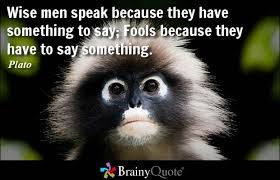 One which is vocalised for all to hear. This would be the one that gives an impression of ourselves to the world. It is often used as a yardstick to gauge our level of education, our politics, our upbringing, class and creed. The spoke words in this category are guarded and carefully worded so as not to jeopardise one's own image. It is our way to engage with the world which would compartmentalise us in our pigeon holes.
One which is vocalised for all to hear. This would be the one that gives an impression of ourselves to the world. It is often used as a yardstick to gauge our level of education, our politics, our upbringing, class and creed. The spoke words in this category are guarded and carefully worded so as not to jeopardise one's own image. It is our way to engage with the world which would compartmentalise us in our pigeon holes.
The second level of spoken words is the one spoken amongst immediate relatives and close ones. Here, the words are less guarded but still a certain amount of restraining is still exercised so as not hurt people around us. We also take into consideration that the younger ones are watching (and listening). We has to be careful with his choice of words to a certain extent. Sometimes emotion takes charge to prove his point. The threshold to lose our composure is lower as we are in the comfort of familiar surroundings and we can exert our authority.
The final level of communication is the unabated one when one engages in a soliloquy with no-holds-barred. All the deep-seated personal disappointments and frustrations may be outpoured with no one to judge. It is an opportune time to re-evaluate, re-strategise and re-brand. This form of introspection can be cathartic. This must be the significance of the signage at the entrance to Temple of Apollo in Greece - Know Thyself.
This similar level of sensory input can be appreciated in other senses as well. We look, see and perceive. We hear, listen and understand. We feel, empathise and quiver. We touch, feel and cringe. We taste, wink and puke.
N .B. Living in a society is an art of dodging and hypocrisy. People who say the right thing but mean the wrong thing are elevated but the individuals who say the wrong things but mean well get the boot. Everyone has to be politically correct all the time to protect the voiceless minority. We cannot call a spade a spade all the time. Sometimes we have to call it a shovel and on other occasions a scoop! http://asok22.wix.com/rifle-range-boy
http://.facebook.com/farouk.gulsara
 One which is vocalised for all to hear. This would be the one that gives an impression of ourselves to the world. It is often used as a yardstick to gauge our level of education, our politics, our upbringing, class and creed. The spoke words in this category are guarded and carefully worded so as not to jeopardise one's own image. It is our way to engage with the world which would compartmentalise us in our pigeon holes.
One which is vocalised for all to hear. This would be the one that gives an impression of ourselves to the world. It is often used as a yardstick to gauge our level of education, our politics, our upbringing, class and creed. The spoke words in this category are guarded and carefully worded so as not to jeopardise one's own image. It is our way to engage with the world which would compartmentalise us in our pigeon holes.The second level of spoken words is the one spoken amongst immediate relatives and close ones. Here, the words are less guarded but still a certain amount of restraining is still exercised so as not hurt people around us. We also take into consideration that the younger ones are watching (and listening). We has to be careful with his choice of words to a certain extent. Sometimes emotion takes charge to prove his point. The threshold to lose our composure is lower as we are in the comfort of familiar surroundings and we can exert our authority.
The final level of communication is the unabated one when one engages in a soliloquy with no-holds-barred. All the deep-seated personal disappointments and frustrations may be outpoured with no one to judge. It is an opportune time to re-evaluate, re-strategise and re-brand. This form of introspection can be cathartic. This must be the significance of the signage at the entrance to Temple of Apollo in Greece - Know Thyself.
This similar level of sensory input can be appreciated in other senses as well. We look, see and perceive. We hear, listen and understand. We feel, empathise and quiver. We touch, feel and cringe. We taste, wink and puke.
N .B. Living in a society is an art of dodging and hypocrisy. People who say the right thing but mean the wrong thing are elevated but the individuals who say the wrong things but mean well get the boot. Everyone has to be politically correct all the time to protect the voiceless minority. We cannot call a spade a spade all the time. Sometimes we have to call it a shovel and on other occasions a scoop! http://asok22.wix.com/rifle-range-boy
http://.facebook.com/farouk.gulsara

Published on June 19, 2016 16:47

